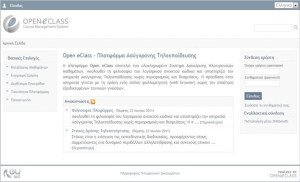Table of Contents
Short Description
#;; Open eClass (ver.2.6) #;; ### The Open eClass platform is a complete Course Management System, used to store and present educational materials. It is the solution offered by the Greek Academic Network (GUnet) to support asynchronous elearning services. Its goal is the incorporation and constructive use of the Internet and web technologies in the teaching and learning process.
The introduction of e-learning into the traditional teaching process provides new capabilities and allows new means of interaction between students and teachers. At the same time, it supports the electronic management, storage and presentation of teaching materials, transcending limitations of space and time and creating the necessary conditions for a dynamic teaching environment.
The Open eClass platform has been designed to either provide an alternative way of teaching and learning process. Teachers are able to quickly organize practical on-line courses, making use of existing educational materials: texts, documents, presentations, pictures, video, exercises and so on. Students themselves can access provided materials via an alternative channel.
The Open eClass platform is available as open source software. Its design principles include ease of use by end users without specialized technical skills, multilingual support, adaptability to current and future demands, and simple software upgrade and extension. The service is accessible via any web browser. ###
Basic Characteristics
Basic platform characteristics are:
- distinct user roles
- distinct course categories
- easy course creation and use
- structured course presentation
- stability and reliability
- ease of administration
User Roles
- The user teacher is responsible for the creation and administration of electronic courses. Teacher accounts are created by the platform administrators, on demand or after an on-line request. They can create an unlimited number of courses, contact student users registered to them, upload educational materials (texts, images, presentations, video, assignments, exercises, etc.), create discussion forums where course participants can interact and generally control the educational process
- The user student can register to courses making an open registration, access educational materials, and participate in working groups, discussion forums and exercises. Student accounts can be created either automatically, by allowing open registration of new users, or by the platform administrators themselves after an on-line request.
- Finally, the administrator has general control over the platform. Administrators can create and administer user accounts and courses, monitor the server and database operation.
Note: There is a number of intermediate user roles
Course Categories
- Open courses are publicly accessible, even by visitors without a user account.
- Registration required restricted courses are accessible to platform users that are registered to them. This means that these courses are open to everyone having an account. For additional security the course teacher can set a registration password.
- Finally, closed courses are only accessible to users after a course teacher allows access to their account by registering them to the course.
Note: There are also inactive courses.
Functionality & Features
The eCourse is the core part of the Open eClass platform. Each eCourse is an autonomous entity which integrates a number of learning tools. More specifically, each eCourse consists of the following learning tools - components which can be enabled and maintained by the teachers:
- Agenda: presents crucial course events in time order (lectures, meetings, etc)
- Documents: educational materials available to students (documents, presentations, images ,etc)
- Announcements concerning the course; they can be optionally e-mailed to students
- Forums, where students can participate in conversation groups and exchange opinions on various aspects of the course
- Working Groups, open or closed, consist of users registered to the course (students and teachers)
- Links on the web to resources relevant to the aspects of the course
- Student Assignments, where students can submit work done in response to assignments set forward by the teacher
- Self-evaluation Exercises created by the teacher, allowing students to practice and test their knowledge
- Course Description presents information about course goals, structure, teachers in charge, etc.
- Glossary, space for adding and managing the terms contained in the course.
- E-Book, a module for uploading and presenting electronic books in HTML format
- Multimedia, where recorded lectures or other multimedia files can be stored and presented to students, either as multimedia files or as external links to multimedia recourses
- Learning Path allows teachers to organize their educational material and students to follow a sequence of learning activity steps (SCORM)
- Wiki, where course participants collaborate on documents, allowing everyone to edit document pages while maintaining full history of changes
- Teleconference, combining real-time on-line conversations, and message exchange
- Questionnaires, which can be used for polls and learning profile surveys
- Drop Box is a file exchange area for students and teachers
- Course Administration Tools, allowing teachers to configure course information (title, keywords, etc.), control eCourse access settings, renew or delete the eCourse, manage registered users, view usage statistics and activate / deactivate eCourse learning tools.
Course units offer a flexible way to organize educational material that is stored in the course learning modules in an articulate structure.
Aims - Benefits
The Open eClass project has the following aims:
- to incorporate new technologies in education activities.
- to utilize existing educational material (notes, presentations, etc.)
- to take constructive advantage of the Internet.
- to be easy to use for both teachers and students.
- to offer a reliable but affordable asynchronous e-learning services.
- to be easy to install and administer, as well as easy to adapt to special or changing requirements.
- to actively developed and supported by the Greek Academic Network GUnet and available without restrictions to everyone.
Contact
For more information please visit platform’s web portal in: http://www.openeclass.org

